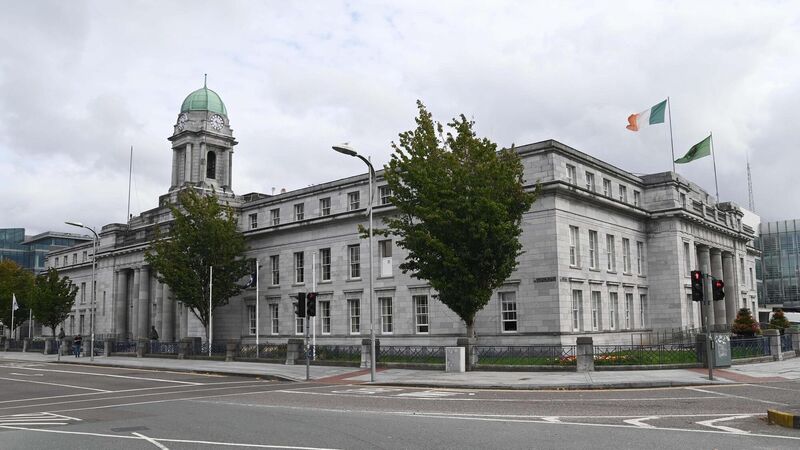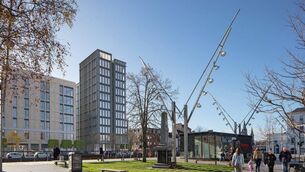No increase in commercial rates or parking charges in Cork City Council's budget for 2024

Councillors voted by a majority of 25 votes to three to adopt the budget at the conclusion of the meeting. Picture Denis Minihane.
Ratepayers and motorists will be heaving a joint sigh of relief as councillors passed a Budget for 2024 for Cork City Council on Wednesday evening without an increase in either commercial rates or car parking charges.
Councillors voted by a majority of 25 votes to three to adopt the budget at the conclusion of the meeting.
The budget, which was set out in detail by Cork City Council CEO Ann Doherty, provides for an investment of €292m in the delivery of services to the city next year.
This is an increase of €24m on the 2023 budget and, as Lord Mayor Cllr Kieran McCarthy pointed out at the opening of the meeting, an increase of €125m on the budget agreed at the beginning of the current Council term in 2019.
The main contributors to the increase in expenditure are an increase in budget to homeless services of €200,000, an increase in the Capital Advance Leasing Facility/Mortgage to Rent of €10.8 million, an increase in Croí Cónaithe funding of €4.7 million, and an increase in payroll of €8.2 million.
The Council CEO said the preparation of the budget had ‘proved to be an extremely challenging task’ and said 2024 would, like 2023, be ‘challenging and uncertain’.
“The cost-of-living issues, inflation and payroll increases due to national pay agreements are still some of the biggest financial challenges for 2024.
“The payroll increase has not yet been quantified for 2024, the price of energy and the cost of inflation, which somewhat stabilised in 2023, continue to remain uncertain and volatile and are continuously changing,” said Ms. Doherty.
“These areas will require close monitoring during 2024.”
Lord Mayor, Cllr Kieran McCarthy said the budget enabled Cork City Council to deliver essential services but also build on the progress that has been made in achieving its strategic goals.
“We make Cork a better place to live, work and invest in,” he said. “Much great work has been pursued in the life of this Council across aspects such as housing, sustainable transportation, community life, climate action and in particular there has been a strong focus on creating new recreational areas.”
While there was a broad welcome for the budget from most councillors, the issue of a €2.4m increase in the payment by Cork City Council to the County Council arising out of boundary changes was described as completely unsustainable by Cllr Shane O’Callaghan who said it was ‘the elephant in the room’.
“This is in addition to the €13m we already pay Cork County Council under the boundary extension agreement every year and that €2.4m could go up even further for next year and the year after depending on inflation,” said Cllr O’Callaghan.
“Such a situation is totally unsustainable.”
The agreement provided for the yearly payment to be index linked, a feature which has led to large increases in the payment in the past number of years due to inflation increases caused by Covid and the war in Ukraine.
Cllr O’Callaghan said that the suggestion from the Council CEO that the additional €2.4m should be capitalised meant that, in effect, the budget had a deficit of €2.4m instead of being balanced.
“If this is not resolved quickly, it will in my view lead to a major confrontation between Cork County Council and Cork City Council and, if it’s allowed go on over a number of years, potentially financial difficulties or even a crisis for the City Council.”
There were only three votes against the budget as presented and these dissenting voices included that of Solidarity/People Before Profit councillor, Brian McCarthy, who described it as a ‘capitalist budget’.
“Walk around this city, we have a massive housing crisis and a massive social crisis and this budget does not come anywhere close to addressing these,” he said.
Cllr McCarthy pointed to a reduction in the funding for maintenance of local authority housing from €15,184,200 last year to €14,932,700 this year, a cut of €251,000. “During a housing crisis, that’s the last thing that should be cut,” he said.
However, it was pointed out by the City Council Finance Director, John Hallahan, that the budget for actual maintenance was being increased by €500,000 for 2024. The reason the figure appeared greater in 2023 is that it had included a larger allocation to meet utility bills such as electricity which had increased due to the fuel shortage caused by the war in Ukraine and other factors but this had eased since last year.
Cllr Lorna Bogue of An Rabharta Glas proposed an amendment which would have meant a 5% increase in the commercial rate but, as she outlined, this would have only impacted in full on 7% of rate payers with the rest getting either a full or partial discount.
Her amendment was defeated by 16 votes to 8 with three councillors recusing themselves from the vote as they contended they had a conflict of interest as they were ratepayers themselves.







 App?
App?


